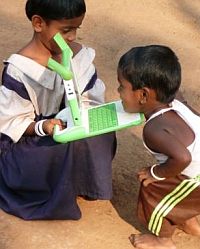One of the major innovations of OLPC consists in the idea that a computer given to a single child (also called 1:1 computing) is the best way to enhance the pupil's ability to learn effectively. It's called ONE-laptop-per-child after all.
In a recent article in ScienceDaily, strong evidence is presented that shows that 1:1 computing allows students in these programs to outperform their peers in traditional classrooms. According to findings of studies published in the Journal of Technology, Learning and Assessment:
Students who have participated in 1:1 computing report higher achievement and increased engagement. This new collection of articles brings together some of the best evidence to date on the implementation and impacts of 1:1 computing.
All of the studies that examined the impact of 1:1 computing on student achievement found that students in the 1:1 settings outperformed their traditional classroom peers on English/Language Arts standardized tests by a statistically significant margin. Study authors also reported on evidence of increased student motivation and engagement, as well as changes in teachers' instructional practices.
This is great news for OLPC. So far the evidence of the effectiveness of 1:1 computing was circumstantial and anecdotal. These are the kind of studies that OLPC should have not only follow closely, but also actively sponsor, and possibly enhance with their own on-the-field experiences and surveys. Although that was never done, it is never too late for OLPC to back up such studies, and to provide additional supporting data.
Teachers matter in 1:1 success
Regardless of the OPLC involvement, the outcomes of these studies is clear. Is this a clear strong, although indirect victory or endorsement for OLPC? Not really. The article clearly states:
"One of the most salient findings was the critical role that teachers played in the success of each 1:1 program," Bebell said. Additional factors critical to student success across 1:1 technology settings included:
- Having a strong commitment from school leadership
- Developing consistent and supportive administrative policies
- Creating professional development opportunities for teachers, particularly the sharing of best practices
It appears that the key for success of the 1:1 computing initiative are teacher involvement and a strong school commitment. In other words, handing out laptops to individual students and let them to learn independently, is not what is found to work effectively. Teachers' involvement, training and professional development is the real key for success. Unfortunately, on a global scale OLPC performs poorly in this regards.
Teachers' training and professional and curricula development is left to local groups and and it happens countries where the role of teachers has been recognized. It should not be a surprise to note that in these countries the OLPC initiative is known to have been the most effective. When such local involvement of teacher' training and curricula development was missing, the program has not shown any significant sign of success.
Therefore, having a global push for sharing experiences, promoting teachers' collaboration and training is the determining factor for the success of the overall OLPC effort.
It is unfortunate and heart shuttering to witness OLPC lack of recognition of the relevance of teachers involvement in the learning process. A laptop will never be able to replace a teacher. It will only be an effective tool for students to improve their learning and teacher to extend their teaching. Scientific evidence now backs this strongly. Let's hope OLPC will follow.




As to the picture "This doesn't work" my feeling is it works a different way which often are missed. Teachers are important but I hope 1to1 educational computing does not become topdown again. OLPC philosphy is very clear on the potential of children teaching themseleves and computing as a tool for playing, doing and thinking.
OLPC philosophy may be very clear, but it is not supported by any evidence that can justify its effectiveness. There are plenty of examples where teachers may be even more in needs when technology is involved. The XO is a tool, not an end. You might have kids that can benefit independently from the use of it, but many will need guidance. In other words, education is much more complicated than OLPC wants us to believe. I would hold a very different opinion if someone would have shown me that the model works on a large scale, as suggested. But unfortunately it doesn't. I don't mean to discredit the project. On the contrary, I simply wish the bottom-up approach to go hand-in-hand with the top down. I bet wonders would result from it.
I read another article in the journal which reframe the issues at hand:
The End of Techno-Critique: The Naked Truth about 1:1 Laptop Initiatives and Educational Change
by Mark E. Weston and Alan Bain
http://escholarship.bc.edu/jtla/vol9/6/
Quoting from the article itself, it states that it is difficult to draw conclusions. most of the reported p values are statstically weak (p>0.05).
"The modest sample size and small effect sizes of this study make it
difficult to draw definitive conclusions. "
This is hardly surprising. Projects that have poor leadership fail? You don't need a study to conclude that. That also means that poor processes are developed (or not developed) to support the project. Again not earth shattering.
I cannot see the logic that 1:1 computing projects that failed, failed because of poor teacher training. They more likely failed because of poor leadership that failed to provide proper processes to support the project (including poor teacher training)
In our experience, teachers with little training still recognize the value of OLPC and adapt their teaching to make good use of it (with the support of their principal)
And kids do amazing things with little help (but lots of encouragement) from their teachers
It seems everyone is to ready to condemn the OLPC program when in developing countries, it is THE ONLY educational reform happening and THE ONLY education resource that most children (and teachers) get.
Every child that learns to love to learn through OLPC is worth a hundred negative comments IMHO.
Just attended a conference on e-learning and one speaker said the gain in rural schools with technology implementation is very evident compared to urban school. IMHO 1:1 will make a even bigger difference. Urban 1:1 deployment in developed countries is a different ball game.
I agree with the main tenets of the posting, indeed the individual teacher is what makes a lot of the difference.
The research mentioned is missing that element, and I quote: "we could not investigate the possible role of teacher differences in the study". Anyway, this research tells us what we know already, "The treatment effect of being in the laptop program had small to moderate effects on the change scores for which significant predictors were found"
On the impact of the individual teacher, see also
http://www.nytimes.com/2010/03/07/magazine/07Teachers-t.html
Developed vs. Developing deployments is completely different, though both important. In developed countries we are enhancing a fundamentally functional system. In developing countries we need to use this as a tool to compensate for resource shortages, time shortages, teacher shortages, etc (and it's not just cash that cures that - it can take generations) as well as unleashing creativity, analytical skills and benefits more strongly associated with 1:1 computing.
Both 1:1 computing studies and studies into the input variables of educational effectiveness are not so thorough in the developing context as developed cases.
The variances in outcomes are far more profound in developing countries (See the UNESCO Education For All 2005 Report and background paper), and the cost of 1:1 computing is far higher percentage of the annual education budget (or even the whole budget, again).
Nevertheless great to see quantitative 1:1 research emerging.